This checkin to GL53DQ5A Holland Park #1 reflects a geocaching.com log entry. See more of Dan's cache logs.
Lovely little park: had never been here before. TFTC.
This checkin to GL53DQ5A Holland Park #1 reflects a geocaching.com log entry. See more of Dan's cache logs.
Lovely little park: had never been here before. TFTC.
This checkin to GC1R2BV Kensington Town Hall Ghost reflects a geocaching.com log entry. See more of Dan's cache logs.
We were only able to spend about 20 minutes searching for this, but didn’t manage to find it, even after looking at the clue. We found what we think must have been its hiding place and wonder if perhaps it’s been muggled again…? Hope not: it’s rare to see such large caches in such urban areas, and it’s always quite satisfying to find one. Good luck, future cachers! Hope it’s still there!
Many of you will remember that we went to Go Ape as part of Ruth & JTA’s stag/hen night, last year… and that we dressed as superheroes.
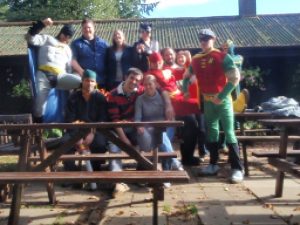
Well: it looks like we made a big difference to one little girl. Do you remember the kid who was scared to go on the big “tarzan swing” until she was cheered on my a group of us, hanging from the next platform along? Well, it turns out that we were mentioned in that girl’s family’s review of the day.

That’s kind-of sweet.
In other news, we’ll be doing another Go Ape trip on 27th March, to celebrate Paul‘s birthday. More of you ex-Aberites read my blog than has, so – if you’re coming – Paul’s asked me to remind you to fill in the form on his blog post about the event (we need to do this so we can pre-book for the appropriate number of people), and we’ll see you there! (superhero costumes are not mandatory, but you know I’ll be wearing mine…)
Early this week, I’ve spent quite a bit of time knee deep in the guts of Phusion Passenger (which remains one of the best deployment strategies for Rack applications, in my mind), trying to work out why a particular application I’d been working on wouldn’t deploy properly after a few upgrades and optimisations on the development server. Ultimately, I found the problem, but for a few hours there there I thought I was losing my mind.
This lunchtime, I decided to pull out all of my instant messenger logs (being out of the office, my co-workers at SmartData and I do a lot of talking via an IM system). I’d had a hunch that, so far this week, “balls” would be amongst my most-frequently typed words, chiefly uttered as yet another hypothesis about why the development server wasn’t behaving itself was blown out of the water. A few regular expressions (to strip it down to just the words I typed) and a run through a word-counter, and I had some results!
Here’s my top words of the work week so far:
| Position | Word(s) |
|---|---|
| 1 – 18 |
the, to, I, a, it, that, of, in, and, on, but, have, what, is, you, just, so, for
Positions 1 through 18 contain some of the most-common conjunctions and pronouns that I use on a day-to-day basis, as well as some common verbs. Nothing surprising there. So far, so good. |
| 19 |
Rails
Between the projects I’ve been involved with and those my colleagues are working on, there’s been a lot of discussion about (Ruby on) Rails around the office so far this week. |
| 20 |
IPN, do
One of the projects I’ve been working on this week has used a payment gateway with an Instant Payment Notification service, so it’s not surprising that “IPN” appeared in the top 20, too… |
| 22 | was, this |
| 24 | my, know, at |
| 27 |
up, don’t
Over 50% of “don’t”s were immediately followed by “know”: Monday was one of those days. |
| 29 | I’m |
| 30 |
yeah, be, [name of troublesome web app]
Not unexpectedly, the name of the project that caused so much confusion earlier this week came up more than a little. |
| 33 | there, one, if |
| 36 |
we, see, problem, get balls, back, all
These seven words never all appeared in a sentence together, but I sort of wish that they had. There’s the key word – balls – apparently the joint 36th most-used word by me between Monday morning and Wednesday lunchtime. |
Other common words this week so-far included “jQuery“, that great JavaScript library (there was some discussion about how we can best make use of the new features provided by version 1.5), “payment” (again; a lot of talk of payment processing, this week), “means” (mostly where I was explaining the results of my investigations into the troublesome server), “tried” (a disappointing-sounding word), “error” (I saw a few of those, to be sure!), and “somehow” (not a reassuring thing to catch yourself saying).
Also pretty common this week was “boiler”, as I explained to my workmates the saga of the boiler at my house, which broke down at the weekend, leaving us with no hot water nor heating until it was repaired on Tuesday. On the upside, I did get to poke around inside the boiler while the repairman was taking it to bits, and learned all kinds of fascinating things about the way that they work. So, a silver lining, there.

With the boiler fixed at home, and the development server fixed at work, it finally feels like this week’s turning into the right kind of week. But for a while there, it didn’t look certain!
Have you come across GeoMidpoint? This web service will help you find the midpoint between any number of geographical points. They’ve got all kinds of proposed uses for it, like finding a convenient restaurant that’s equidistant from each of you and your friends, but one of the more frivolous activities you can enjoy using it for is to find your home “centre of gravity”. Put in everywhere you’ve lived (and, optionally, how long you lived there for, as a weighting factor), and it’ll show you the centre point.
I gave it a go. Here’s where I’m centred.
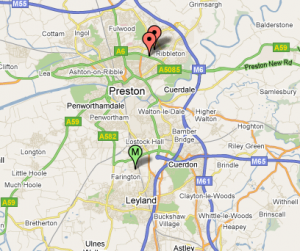
Okay, you think – it’s not so surprising that the centre point is near Preston: I spent over a decade living there. But here’s the quirk: my addresses weren’t weighted by how long I’d lived there. All I did is put in everywhere I’d lived for six months or more, and let these places all have equal weight.
Curious, then, that the centre point comes to within a quarter hour’s drive of either of my parents’ houses, in Preston.
I suppose there are some balancing factors, here: places that cancel one another out quite nicely. The Northern bias of Scotland is counteracted by the comparative Southernness of Aberystwyth, Oxford, and Surrey. The strong Western bias of the many different places I lived in Aberystwyth are invalidated by quite how far East Aberdeen and London are. But still, it seems to be a quirky coincidence to me that the centre point would be so close to where I did most of my growing up, despite how much I’ve moved around.

This observation comes only a little while after the other Earthlings and I have finished signing the paperwork on what is later this year to become our new home, New Earth. It’s still in the Oxford area, but provides us with some nice things that we’re looking forward to, like more space (something we never seem to have enough of!). And any of you who’ve visited by car will probably appreciate how much more accessible the driveway is…
We’ll be moving this Summer, and in doing so we’ll pull my little green triangle over into Chorley. Better that, I think, than out in the Irish sea, which is where it’d be if I weighted where I’d lived by the amount of time I’d spent there!
Recently, I learned that the roads in Great Britain are numbered in accordance with a scheme first imagined about ninety years ago, and, as it evolved, these road numbers were grouped into radial zones around London (except for Scotland, whose road numbering only joined the scheme later). I’d often noticed the “clusters” of similarly-numbered roads (living in Aberystwyth, you soon notice that all the A and B roads start with a 4, and I soon noticed that the very same A44 that starts in Aberystwyth seems to have followed me to my home here in Oxford).

Who’d have thought that there was such a plan to it. If you’re aware of any of the many roads which are in the “wrong” zone, you’d be forgiven for not seeing the pattern earlier, though. However, seeing all of this attempt at adding order to what was a chaotic system for the long period between the Romans leaving and the mid-20th century makes me wonder one thing: are there “roadspotters”?
There exist trainspotters, who pursue the more-than-a-little-bit-nerdy hobby of traveling around and looking at different locomotives, marking down their numbers in notepads and crossing them off in reference books. Does the same phenomena exist within road networks?
It turns out that it does; or some close approximation of it does, anyway. One gentleman, for example, writes about “recovering” road signs formerly of the A6144(M), which – until 2006 – was the UK’s only single-carriageway motorway. A site calling itself The Motorway Archive has a thoroughly-researched article on the construction history of the M74/A74(M) from Glasgow to Carlisle. Another website – and one that I’m embarrassed to admit that I’d visited on a number of previous occasions – reviews every motorway service area in Britain. And, perhaps geekiest of all, the Society for All British and Irish Road Enthusiasts (SABRE) maintains a club, meetups, and a thoroughly-researched wiki of everything you never wanted to know about the roads of the British Isles.
From what started as a quick question about British road numbering, I find myself learning about a hobby that’s perhaps even geekier than trainspotting. Thanks, Internet.
I talk a lot. If you don’t want to listen to me ramble, and you’re just looking for the free deed poll generator, click here.
After Claire and I changed our names back in 2007, I actually took the time to do a little research into deeds poll (or, more-specifically in this case, deeds of change of name). It turns out that we did it the wrong way. We paid a company to do all of the paperwork for us, and – while it wasn’t terribly expensive – but it wasn’t free, and “free” is exactly how much it ought to cost.
In the intervening years I’ve helped several friends to change their names via deeds poll (yes, “deeds poll” is the correct plural), and I’ve learned more and more about why the whole process should be simpler and cheaper than many people would have you believe.
A deed poll, by definition, is nothing more than a promise signed by one person (it’s not even a contract – it’s got little more weight than a New Year’s resolution), on paper which has straight edges. That’s what the word “poll” actually means: that the paper has straight edges. Why? Because back then, a contract would typically be cut into two on an irregular line, so that when the two halves came together it would be clear that they were originally part of the same document – an anti-forgery measure. A deed poll, because it’s signed only by one person, doesn’t need to be separated like this, and so it has straight edges.

That means that’s it’s perfectly legitimate for you to write, on the back of a napkin, “I have given up my name [former name] and have adopted for all purposes the name [new name]. Signed as a deed on [date] as [former name] and [new name]. Witnessed by [witnesses signature(s)].”
The problem comes when you send that napkin off to the Inland Revenue, or the DVLA, or the Passport Office, and they send it back and laugh. You see, it helps a hell of a lot if your deed poll looks sort-of official. You ought to put some work into making it look nice, because that makes a world of difference when you ask people to believe it. That’s not to say that they won’t laugh at you anyway – the Passport Office certainly laughed at me – but at least they’ll accept your name change if it has an air of authority and is covered with all of the most-relevant legalese.
Behind the dozens of scam artists who’ll charge you £10, £20, £30, or even more to produce you an “official” deed poll (tip: there’s no such thing), there are one or two “free” services, too. But even the best of these has problems: the site is riddled with advertisements, the document isn’t produced instantly, you’re limited in how many deed polls you can generate, and – perhaps worst of all – you have to give them your email address in order to get the password to open the documents they give you. What gives?

So I’ve made my own. It’s completely free to use and it’s available at freedeedpoll.org.uk: so what are you waiting for – go and change your name! Oh, and it’s also open-source, so if you want to see how it works (or even make your own version), you can.
Why? Well: I don’t like feeling like I’ve been scammed out of money, so if I can help just one person change their name for free who might otherwise have been conned into paying for something that they didn’t need: well, then I’ve won. So change your name or help your friends and family to, on me, or just download my code and learn a little bit about Ruby, Sinatra, and Prawn (the technologies that power the site). What’re you waiting for?
This piece of fiction’s been floating around the Internet, recently: I first saw it on Faye‘s blog and wanted to share it. I believe it’s originally written by a Susan from Glasgow, but I haven’t find anything else to pinpoint the original author.
The law discriminates against rape victims in a manner which would not be tolerated by victims of any other crime. In the following example, a holdup victim is asked questions similar in form to those usually asked a victim of rape:
“Mr. Smith, you were held up at gunpoint on the corner of 16th and Locust?”
“Yes.”
“Did you struggle with the robber?”
“No.”
“Why not?”
“He was armed.”
“Then you made a conscious decision to comply with his demands rather than to resist?”
“Yes.”
“Did you scream? Cry out?”
“No. I was afraid.”
“I see. Have you ever been held up before?”
“No.”
“Have you ever given money away?”
“Yes, of course–”
“And did you do so willingly?”
“What are you getting at?”
“Well, let’s put it like this, Mr. Smith. You’ve given away money in the past–in fact, you have quite a reputation for philanthropy. How can we be sure that you weren’t contriving to have your money taken from you by force?”
“Listen, if I wanted–”
“Never mind. What time did this holdup take place, Mr. Smith?”
“About 11 p.m.”
“You were out on the streets at 11 p.m.? Doing what?”
“Just walking.”
“Just walking? You know it’s dangerous being out on the street that late at night. Weren’t you aware that you could have been held up?”
“I hadn’t thought about it.”
“What were you wearing at the time, Mr. Smith?”
“Let’s see. A suit. Yes, a suit.”
“An expensive suit?”
“Well–yes.”
“In other words, Mr. Smith, you were walking around the streets late at night in a suit that practically advertised the fact that you might be a good target for some easy money, isn’t that so? I mean, if we didn’t know better, Mr. Smith, we might even think you were asking for this to happen, mightn’t we?”
“Look, can’t we talk about the past history of the guy who did this to me?”
“I’m afraid not, Mr. Smith. I don’t think you would want to violate his rights, now, would you?”
It’s an effective story, I think, despite the reinforcement of the illusion that rape victims are at most risk from the hypothetical “stranger in a dark alley” (when in actual fact, most rape is conducted by somebody known personally to the victim).
The crime of rape is a whole minefield of complications: the issue of consent; the fact that the only witnesses are generally the victim and their attacker(s), and the sometimes-fuzzy definitions used in many countries’ laws, to name a few. We’re less than a week since a particularly troublesome and emotive case being tried in Cheltenham. In this particular incident, a 15 year-old girl accused a 14 year-old boy of raping her, but it later became clear through the vast inconsistencies in her story that this almost certainly a fabrication. Now, naturally, she’s now being convicted of attempting to pervert the course of justice.
The statement from Women Against Rape? “It is awful that a girl so young has been prosecuted in this way.”
Whoah, whoah – let’s step back a moment. Let’s get this clear: it’s awful that a young woman who lies about being raped, threatening a young man with prison and a lifetime of being on the sex offenders’ register, is being convicted for this? That’s your stance on this? Did I accidentally turn over two pages at once, because I feel like I’ve missed something here.
It’s already awful and tragic that we live in a world where a majority of rape goes unreported. Let’s not also try to make it into a world where it’s acceptable to knowingly make false accusations of crimes, especially those with life-altering consequences.
Here’s what Fox News have to say about IPv6:
Web developers have tried to compensate for [the IPv4 address shortage] by creating IPv6 — a system that recognizes six-digit IP addresses rather than four-digit ones.
I can’t even begin to get my head in line with the level of investigative failure that’s behind this sloppy reporting. I’m not even looking at the fact that apparently it’s “web developers” who are responsible for fixing the Internet’s backbone; just the 4/6-digits thing is problematic enough.
Given that Wikipedia can get this right, you’d hope that a news agency could manage. Even the Daily Mail did slightly better (although they did call IPv4 addresses 16-bit and then call them 32-bit in the very next sentence).
Oh; wait: Fox News. Right.
For the benefit of those who genuinely want to know, one of the most significant changes between IPv4 and IPv6 is the change from 32-bit addresses to 128-bit addresses: that’s the difference between about 4 billion addresses and 340 undecillion addresses (that’s 34 followed by thirty-eight zeros). Conversely, adding “two digits” to a four-digit number (assuming we’re talking about decimal numbers), as Fox News suggest, is the difference between a thousand addresses and a hundred thousand. And it’s not web developers who are responsible for it: this change has nothing to do with the web but with the more fundamental architecture of the underlying Internet itself.
My boss, Simon, and his family have recently gotten a new puppy, called Ruby.

Apparently the little girl’s full of energy and bounce and is taking up a lot of time while she gets settled in to her new home. While talking on an instant messenger with my boss earlier this week, he was telling me about how he’d had to get up in the middle of the night and take her for a run around the garden, because the little tyke was still full of beans and not sleepy. And that’s why I made one of those fabulous moments in instant messaging: when you type something that can be read multiple ways:
Dan: Puppy eating time?
Obviously, I had meant:
Dan: [Is the] puppy eating [i.e. consuming a lot of your] time? [Poor you, you're not getting much sleep.]
Just three words. So simple. But a split second later the other, inevitable way of reading it became clear:
Dan: [Is it] puppy-eating time? [I want to eat your puppy!]

Shit. That’s not what I meant! I tried to correct myself:
Dan: I don't want to kill your puppy!
Then I realised: what if my boss didn’t read it the wrong way at all? What if he already understood that I was asking about how much time and energy the new family member was taking up… if that’s the case, then I’d just made myself look like a psychopath who’s contemplating killing his family pets. I backpedalled:
Dan: That came out all wrong. I mean: of course I don't want to kill your puppy - I just didn't want you to think that I did, in case you thought that for some
reason.
That didn’t help. This was just going from bad to worse. Then, salvation came:
Simon has reconnected.
Simon: Sorry, had to reboot - did you get my message about our new puppy?
This weekend the other Earthlings and I celebrated Burns Night. Of course, we’re just a little bit eccentric between the four of us to celebrate it like normal people, so we decided to apply a little bit of a twist to a tried-and-tested theme.
A traditional Burns Night consists of a hearty meal of haggis, ‘neeps and tatties, drinking of whisky, and the recitation of songs, poems, and stories (with a particular emphasis on works by the poet himself). We all enjoy a nice haggis – albeit a veggie one, which I dubbed a vaggis, for Ruth and Paul – and a dram or two of decent whisky – with the exception of Paul, who substituted a series of Irn-bru-themed cocktails – so these aspects were kept intact. But we decided to swap out the traditional songs, poetry and storytelling for something a little more contemporary…
In our newly-invented, “Argh, It Burns! Night”, attendees each perform a reading of the worst piece of fan fiction that they can possibly find. There’s a wealth of truly awful fan fiction in the world, and we wanted to do justice to it by performing readings and voting on which was the most awful, or most entertainingly terribly. I suppose this was inevitable: after Troma Night gave us years of watching the worst films imaginable, the next step had to be to expand to other media.
After finishing our supper and fortifying ourselves with a drink or two, we drew lots to determine who was to go first. JTA began.

JTA had chosen to read Guywars, by Josh Vandergriff, a strange crossover between the Monkey Island and Star Wars franchises, with an embarrassing number of “jokes” stolen verbatim from Spaceballs. Depite lurching between the past and present tense and riddled with humour a little immature even for the playground, we couldn’t help but laugh out loud at some of the accidental moments of literary genius, like this gem:
Guyvador [a Darth Vader-like character] breaths like someone breathing out of a paper bag might breath, only without that great lunchy smell.
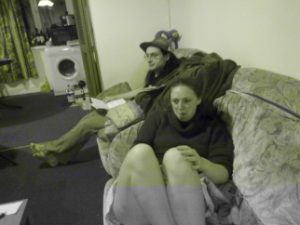
Next up was Ruth, who shared with us all Garfield: First Blood, the first in a two part series of stories in which Garfield repeatedly rescues Natalie Portman from vampire gangsters. And I’m ashamed to say that I really enjoyed this piece. Not because it was good – far from it – but because it was so beautifully awful.
“HAHA Garfield!, We demand the blood Bank of USA give us 600 million gallons of blood, all in one hundred dollar bills or else we will be making evening breakfast out of Natalie Portman!” Said the head Vampire Gangster with menace.
I’m honestly not convinced that the author is even aware of who Garfield is, because instead of being a lasagne-eating, lazy feline, the Garfield in this story carries a handgun (difficult with paws), drives a pickup truck (very difficult when your knees are backwards), and woos movie stars. I would love to see somebody make a comic book of this story.
But although the author – the optimistically-titled “ShakespeareHemmingway” – may not know who Garfield is, he certainly knows who Natalie Portman is. The story ends with a postscript to let her know, if she’s reading this, that if she would like to date him, that would be okay.

Paul took the chair next, giving us a reading of the first six chapters (they’re miniscule, although one gets the feeling that this is perhaps because large chunks of them are missing, based on the continuity problems) of HHHHHHHHHHHHHHHHHHHHHHHHHHHHHH – yes, that’s really it’s title.
Listening to this story is like going to Azathoth‘s house and dropping acid. While outwardly it sort-of appears to be Harry Potter fanfiction, I’m convinced that it’s something more: I’m not sure what. Perhaps it’s a chant to summon demons of insanity, or perhaps it’s a piece of neo-Dadaist genius, but there’s something there. What I can tell you, though, is this: hearing it makes you feel like your brain is at risk of melting out through your ears.
Harry vomited steam and summoned a great meteor from space to smash into Hogwarts and kill everyone there, for no reason at all… He encased the entire meteor in a wreath of holy fuckfire and flew through Mercury, killing the fuck out of it. Then he sent Mercury’s carcass into Venus, killing the fuck out of it and making every vagina in the galaxy explode, and inside every vagina a booby sang of mortal life’s fleeting precipice.
Seriously. You can’t tell me that doesn’t mean something?
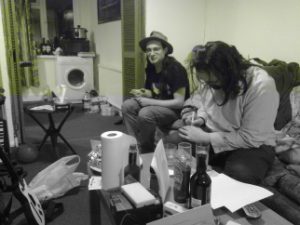
For my story, I’d selected QUAKE THE EPIC FIGHT!, which is – I hope – probably the only piece of Quake-themed fanfiction to have ever been written. It’s starts – and finishes – with Chapter One, which kind of makes me wonder why it bothers with a chapter title in the first place, and tells the story of old schoolfriends Bill and Norman as they fight together against the, and I quote, “evill strogg robot alien things who kill humans”.
It’s pretty dire, and remarkably hard-to-read on account of it’s random tense changes, spelling (both awful and inconsistent), and the absence of punctuation. Let me share a sentence:
ther vas loud boom when bills ship crash but ther vas louder more BOOM when normans did. “oh no is he ded!” bill sayed lik sad but ther vas body who climed up from shp and they ran to others in happy!
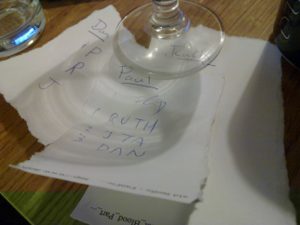
Finally, it came time for the voting – by STV, of course, because we’re not savages. After a run-off round between tied winners Ruth and Paul, Ruth finally came out on top! Garfield had it!

JTA has decided to provide a prize that fit with the theme. Fanfiction is a good way to ruin a perfectly good story… so what happens if you ruin whisky? You get this, it turns out: Jack Daniels and ginger, in a can. Ruth was less-than-delighted by her prize (it didn’t taste too bad all by itself, but the soapy aftertaste was pretty grim), but managed to gulp down the whole can with minimal help from the rest of us.
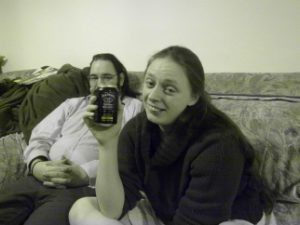
Ruth mentioned that there existed a sequel to the piece of fan fiction she’d read, and we insisted that she give us a reading of this, too. And so, we got the dubious pleasure of a live reading of Garfield: First Blood Part II: The Legend of the Warrior of the Forever Fist, feature fantastic paragraphs like this closing moment:
Garfield and Natalie Portman went on her bed and embraced for love makings. They rubbed eachother with oil and perfume and touched eachother all over. Their bodies then joined like peanut butter and jelly and created delicious loving all night long.
Wow. The author even updated his postscript to let his admired Natalie Portman know that he’s still single (shocking, I know, that a talented author like this can’t get a date) if she’s interested.
All in all, the first ever Argh, It Burns! Night was an amazing, hilarious, and only sometimes painful, success. We’re totally going to have to do this again next year.
I recently came across the Mobile One-Time-Passwords project, which aims to make a free, secure alternative
to commercial two-factor authentication systems (like SecurID). The thinking is pretty simple:
virtually everybody now carries a mobile phone capable of running basic applications, so there’s no reason that such an application couldn’t provide the processing power to generate
one-time-passwords based on a shared secret, a PIN number known only to the authenticating party and to the server, and the current date and time stamp.
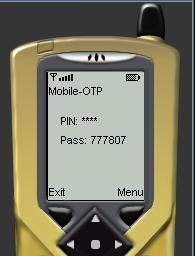 Great! But it turns out that despite there being libraries to produce server-side implementations of the technology in PHP, Perl, and C, nobody had yet bothered to write
one in that most marvelous of programming languages, Ruby.
Great! But it turns out that despite there being libraries to produce server-side implementations of the technology in PHP, Perl, and C, nobody had yet bothered to write
one in that most marvelous of programming languages, Ruby.
Well, now I have. So if anybody’s got the urge to add one-time-password based security to their Rails or Sinatra app, or would like to write an MOTP client for their Ruby-capable smartphone: well, now you can.
Just want to know how to ‘fix’ Steam’s password field? Scroll down to “How to Fix It”
Steam & Security Theatre
You’re a smart guy. You’re not stupid about computer security. And that’s why you always make sure that you use a different password for every service you use, right? You might even use a different password for every account, even when you have different passwords on the same service. You know that there are really, really good reasons why it’s simply not good enough to, for example, have “high-security”, “general use” and “low security” passwords, and re-use each of them in several places. And if you don’t know that: well, take my word for it and I’ll explain it in detail later.
It’s no great hardship to have lots of long, complex, effectively-random passwords, these days. Tools like SuperGenPass, LastPass, and KeePass, among others, mean that nowadays it’s so easy to use a
different password for every service that there’s no excuse not to. So you probably use one of those (or something similar), and everything’s great.
 Except for
that one application – Steam. I have Steam save my password on my desktop PC (by the time somebody steals
my desktop PC and breaks into the encrypted partition on which my data files lie, I have bigger problems than somebody stealing my Just Cause 2 achievements), but it forgets
the password every time that Ruth uses her Steam account on my computer. No problem, I think: I can easily
copy-paste it from my password manager… nope: Steam won’t let you paste in to the password field.
Except for
that one application – Steam. I have Steam save my password on my desktop PC (by the time somebody steals
my desktop PC and breaks into the encrypted partition on which my data files lie, I have bigger problems than somebody stealing my Just Cause 2 achievements), but it forgets
the password every time that Ruth uses her Steam account on my computer. No problem, I think: I can easily
copy-paste it from my password manager… nope: Steam won’t let you paste in to the password field.
What? If you ask Valve (Steam’s creators) about this, they’ll say that it’s a security feature, but that’s bullshit: it’s security theatre, at best. And at worst, it means that people like me are inclined to use less-secure passwords because it’s harder to memorize and to type out that a more-secure password would be.
How to Fix It
Well, obviously the best way to fix it would be to successfully persuade Valve that they’re being stupid: others are already trying that. But what would be nice in the meantime would be a workaround. So here is is:
Program FilesSteamPublicSteamLoginDialog.res (Program FilesSteamPublicSteamLoginDialog.res on 64-bit Windows, somewhere else entirely on a Mac) using
your favourite text editor (or Notepad if you don’t have a favourite). Take a backup of the file if you’re worried you’ll break it.
"PasswordEdit" section (starting at about line 42), you’ll see name/value pairs. Make sure that the following values are set thusly:
"tabPosition" "1"
"textHidden" "0"
style="TextEntry"
The next time you load Steam, you’ll be able to paste passwords into the password field. The passwords won’t be masked (i.e. you’ll see the actual passwords, rather than asterisks), but the dialog never loads with a password pre-populated anyway, so as long as you make sure that nobody’s looking over your shoulder while you type, you’re set!
Update: let’s face it, Valve’s security policies suck in other ways, too. Please read the tale of a friend-of-a-friend who’s desperate to change her Steam username.
This checkin to GL4ZBARC Rock Edge reflects a geocaching.com log entry. See more of Dan's cache logs.
Despite the foul weather I really enjoyed exploring this little nature reserve (and not just because it gave me a break from my cross-town cycle!) Photos attached of me by the notice board, down by the cliffs, and of the cliffs with me pointing at them (because otherwise those cliffs could be anywhere; but only I would wear a jacket like that!). Email to follow. TFTC.

This checkin to GL4ZBA6C Son of the The Lonely tree reflects a geocaching.com log entry. See more of Dan's cache logs.
Looks like I must have been there JUST before mumzoid970! Following the coordinates, I was standing almost on top of it (well, as close as one can get!) before I thought to look down and spotted it. TFTC.